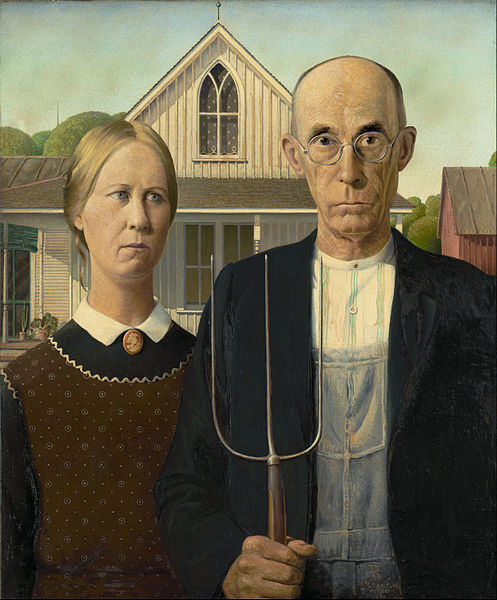Cad a dhéanfaidh tú ar an deireadh seachtaine seo? (What are you doing this weekend?) Posted by róislín on Feb 25, 2014 in Irish Language
(le Róislín)

Bean: ‘Cad a dhéanfaidh tú ar an deireadh seachtaine seo?’ Fear: ‘Fanfaidh mé anseo i mo sheasamh agus cuma Ghotach orm.’ Bean: ‘Mise freisin.’ (fortheideal le Róislín; pictiúr: Gotach Meiriceánach, nmifa American Gothic, le Grant Wood, nasc thíos)
A couple of months ago we posed this question on the Transparent Language Irish Blog:
Cad a dhéanfaidh tú ar an deireadh seachtaine seo? (What are you doing this weekend?)
https://www.facebook.com/learn.irish/posts/10152034063644295?stream_ref=10
Let’s look at some possible answers. How many can you translate?
1. Rachaidh mé ag siopadóireacht. [… egg SHOP-uh-dohrzh-ukht]
2. Rachaidh mé ag iascaireacht. [egg EE-usk-irzh-ukht]
3. Rachaidh mé ag snámh. [egg snawv]
4. Beidh mé ag garraíodóireacht. [egg GAH-ree-uh-dohrzh-ukht]
5. Beidh mé ag péinteáil an tí. [egg PAY-tchaw-il un tchee]
6. Seinnfidh mé ceol ag seisiún ceoil. [SHEN-hee may kyohl ag SHESH-oon kyoh-il]
7. Seinnfidh mé an dordghiotár ag tobsheisiún. [SHEN-hee may un DORD-YIT-awr egg TOB-HESH-oon]
8. Beidh mé ag imirt cluichí ríomhaire. [egg IM-irtch KLIH-hee REE-virzh-uh]
9. Beidh mé ag imirt fichille i Holland Park, Londain. [… egg IM-irtch FIH-hyil-uh …]
10. Déanfaidh mé obair bhaile do mo rang Gaeilge. [DJAYN-hee may OB-irzh WAHL-yuh duh muh rahng GAYL-ig-yuh]
11. Léifidh mé Blag Gaeilge de chuid Transparent Language. [LAY-hee may blahg GAYL-ig-yuh deh khwidj Transparent Language]
All of these answers have an ending for the verb that shows that it is in the future tense:
rachaidh [RAH-khee], will go. This is the irregular future form of the verb “téigh.” You can see why it’s considered irregular, since no part of “téigh” is repeated in the future. With regular verbs, in contrast, you can always see something of the core, even as the time frame changes, as in “dún / dúnfaidh“.
beidh [bay, almost “bay-ee”], will be
seinnfidh [ SHEN-hee], will play (specifically for music, not games)
déanfaidh [DJAYN-hee], will do
léifidh [LAY-hee], will read
And how about the answers several readers posted (a, b, and d translated here into Irish; c was already in Irish)? Seo iad:
a. Beidh mé ag ól, tada seachas a bheith ag ól.
b. Beidh mé ag obair sa mhaidin agus ag ól agus ag damhsa san oíche.
c. Seinnfidh mé ceolchoirm, I will play a concert. (Note the difference between this and “seinnfidh mé ceol,” which is “I will play music.”)
d. Beidh mé ag obair Dé Sathairn; rachaidh mé go teach an phobail; beidh mé ag cuidiú le cara liom.
Go raibh maith agaibh, a Jack, a Ahmad, a Toby, agus a Jared as scríobh isteach.
Céard fúibhse [FOO-iv-shuh]? What about you? Cad a dhéanfaidh sibhse ar an deireadh seachtaine seo chugainn? — SGF, Róislín
Gluais: a bheith, to be; ag imirt, playing (for “games,” not “music”); ag ól, drinking; cara liom, a friend of mine, lit. a friend with me; chugainn, toward us, to us, as in “an deireadh seachtaine seo chugainn,” lit. the end of week toward us; cluiche, game; cuidiú, helping, to help, followed by “le” (with) or other forms of “le” (liom, leat, leis, léi, srl.); dordghiotár, bass guitar; ficheall, chess, fichille, of chess; fúibh, about you (plural), from the preposition “faoi;” nmifa (nó mar is fearr aithe), aka (implying the “better-known” name or title); pobal, people (in the sense of “congregation); ríomhaire, computer; seachas, except, besides; tada, nothing; seo, this; teach [tchakh], house, tí, of (a) house, an tí, of the house; teach an phobail, church; tobsheisiún, jam session
Fortheideal don bpictiúr:
Bean: ‘Cad a dhéanfaidh tú ar an deireadh seachtaine seo?’ (What are you doing this weekend?)
Fear: ‘Fanfaidh mé anseo i mo sheasamh agus cuma Ghotach orm.’ (I’ll stay here standing looking Gothic, lit. with a Gothic appearance on me.)
Bean: ‘Mise freisin.’ (Me too.)
Nasc don bpictiúr: http://en.wikipedia.org/wiki/File:Grant_Wood_-_American_Gothic_-_Google_Art_Project.jpg

Build vocabulary, practice pronunciation, and more with Transparent Language Online. Available anytime, anywhere, on any device.




Leave a comment: